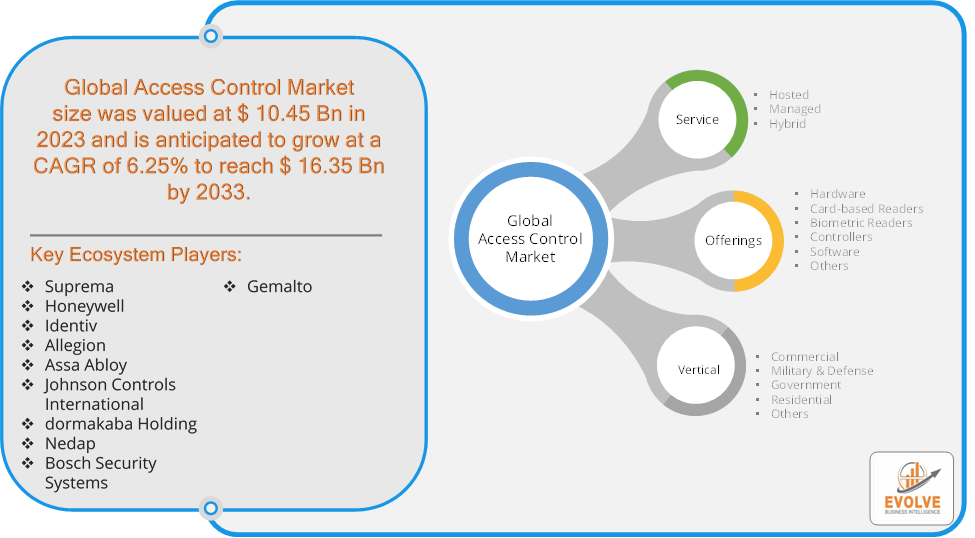Access Control Market Projected to Achieve 6.25% CAGR Growth During Forecast Period

Evolve Business Intelligence has published a research report on the Global Access Control Market, 2023–2033. The global Access Control Market is projected to exhibit a CAGR of around 6.25% during the forecast period of 2023 to 2033.
Evolve Business Intelligence has recognized the following companies as the key players in the global Access Control Market: Suprema, Honeywell, Identiv, Allegion, Assa Abloy, Johnson Controls International, dormakaba Holding, Nedap, Bosch Security Systems and Gemalto.
 More Information: https://evolvebi.com/report/access-control-market-analysis/
More Information: https://evolvebi.com/report/access-control-market-analysis/
Market Highlights
The Global Access Control Market is projected to be valued at USD 16.35 Billion by 2033, recording a CAGR of around 6.25% during the forecast period. The Access Control Market refers to the sector of the security industry that deals with the provision of systems and solutions for regulating who can enter or use resources in a given environment. These systems and solutions are designed to enhance security by ensuring that only authorized individuals can gain access to specific areas, information, or assets.
The Access Control Market is driven by various factors including the growing need for security in residential, commercial, and industrial sectors, increasing instances of data breaches and security threats, advancements in technology, and regulatory requirements. Trends in the market may also focus on the adoption of smart and connected devices, the integration of artificial intelligence and machine learning for predictive security measures, and the shift towards cloud-based solutions.
The COVID-19 pandemic had significant impacts on the Access Control Market. With the emphasis on reducing physical contact to prevent virus transmission, there was a surge in demand for contactless access control technologies. Solutions such as facial recognition, RFID, and mobile-based access systems gained popularity as they minimize physical contact compared to traditional card swipes or keypad entries. The pandemic heightened awareness of health and safety in various environments. Access control systems were increasingly integrated with health screening solutions, such as temperature checks and health status verification, to enhance overall safety protocols. The shift towards remote work and the need for flexible access management solutions led to an increased adoption of cloud-based access control systems. These systems offer remote monitoring and management capabilities, which are particularly useful in a distributed workforce scenario. The pandemic caused disruptions in global supply chains, affecting the availability and delivery of access control hardware and components. This led to delays and increased costs for implementing or upgrading access control systems. As remote work became more prevalent, there was a rise in the need for secure digital access solutions. Organizations looked for ways to securely manage remote access to systems and data, leading to growth in logical access control solutions and secure authentication methods.
Segmental Analysis
The global Access Control Market has been segmented based on Service, Offerings and Vertical.
Based on Service, the Access Control Market is segmented into Hosted, Managed and Hybrid. The Hybrid segment is anticipated to dominate the market.
Based on Offerings, the global Access Control Market has been divided into Hardware, Card-based Readers, Biometric Readers, Controllers, Software and Others. The Card-based Readers segment is anticipated to dominate the market.
Based on Vertical, the global Access Control Market has been divided into Commercial, Military & Defense, Government, Residential and Others. The Commercial segment is anticipated to dominate the market.
More Information: https://evolvebi.com/report/access-control-market-analysis/
Regional Analysis
The Access Control Market is divided into five regions: North America, Europe, Asia-Pacific, South America, and the Middle East, & Africa. North America, particularly the United States and Canada, is a leading market for access control systems due to advanced infrastructure, high technology adoption, and stringent security regulations. Increased focus on security and compliance, adoption of advanced technologies like biometric systems, and significant investments in smart building technologies. Europe has a mature access control market with high adoption rates of advanced technologies. Key markets include Germany, the UK, France, and the Nordic countries. Expansion in Eastern Europe, integration with other smart building systems, and growth in sectors like healthcare and finance. The Asia-Pacific region is experiencing rapid growth in the access control market, driven by urbanization, industrialization, and technological advancements. Growth in emerging economies like China and India, adoption of smart city technologies, and rising demand for mobile and cloud-based solutions. Latin America is a growing market with increasing adoption of access control systems driven by urbanization and rising security needs. Adoption of cost-effective and scalable solutions, integration with smart building systems, and expansion into emerging economies. The Middle East and Africa show strong growth potential in the access control market, driven by rapid urban development and increasing security needs. Investments in infrastructure projects, growth in commercial real estate, and heightened focus on security in high-profile locations.
